Purpletelescope - Random Studyblr

More Posts from Purpletelescope and Others
How to set up a research journal
This is just one way you can set up a research journal but it's helping me tremendously so maybe it also works for you. My set-up is partially inspired by this video by Answer in Progress and I suggest you check out their curiosity journal.
Preparation
First you need a notebook. The trick is to find a notebook that you're not afraid to "ruin". We all want a really neat, aesthetic research journal, but the reality looks more like hasty scribbles, but that's okay, that's where the research breakthroughs happen.
I personally bought a cheap lined notebook from Søstrene Grene that I thought looked cute and put a sticker on it. That way I feel good about using it but I also don't mind when my handwriting gets messy because it was only like 3€.
You should also stock up on pens you like writing with. Different colour highlighters and post-its are also a good idea but not a must. Keep it cheap but comfortable.
Title Page
Here you should put down all the really important information: year, title, deadlines, word count, supervisors. Maybe add an inspirational quote to spice it up but keep it simple and relevant.
Key
This should either be your next or your last page. I personally use the last pages of my journal so I can add thing and find it easier. Your key is there to list abbreviations and symbols.
For example, I have different symbols for statistics, dates, new terminology, questions, breakthroughs, important notes and abbreviations for the most important terms in my field. It's shorter to write T9N than Translation.
The trick here is to have enough abbreviations and symbols to save time and effort but not so many that you constantly have to look back and forth between your page and key. They should be memorable and not easy to confuse.
Topic Mind map
If you hate mind maps you can skip this of course or use a different method but what helped me is to visualise all the topics that connect to my research project in a mind map. I then colour-coded the main groups of topics with my highlighters. It helps me to keep an overview on how many topics I need to do research on.
Proposal
If you're writing a thesis/dissertation it can be helpful to have a page set aside for your proposal and take some bullet point notes on methodology, chapter structure, research context, aims and objectives and think of some titles. You can also do this for your lit review and a list of works to include.
Hypothesis and Question Pages
I set aside four pages for this but you can adjust this to your needs. The first page is my hypothesis. It doesn't have to be fully formed yet, it can just be bullet points with five question marks. You can always revise and update it but it is important to keep an eye on what you're actually trying to find out.
The next idea is basically just stolen from Answer in Progress: a section for big questions, medium questions and little questions. These aren't necessarily hypotheses you aim to answer but questions you have about your topic that might be good to look into (maybe they lead somewhere, maybe they don't).
Research Notes
Now comes the big, fun part. Research notes are allowed to be a little messy but you should have some sort of system so you can actually find what you're looking for afterwards. I'm currently just looking at books and articles so that's what my system is based on. You can totally adjust this to include other forms of research.
What I do is that I put down and underline the author and title of my source. Underneath that I use my highlighters and mark the topic of the paper based on how I colour-coded them in my mind map. You might have to do this after you've finished reading. For example, if a text talks about censorship and dubbing in Germany, three of my topics, I will draw three lines in light blue, dark blue and red, the colours I chose for those topics. This way you can easily browse your notes and see which pages are talking about which topics.
When it comes to the actual research notes, I include the page number on the left and then take bullet point notes on whatever is relevant. These are often abbreviated and paraphrased but if something is especially important I will write down a full quote.
As mentioned earlier, I have a key of symbols I use so I can simply put down a '!' in order to differentiate a research breakthrough from a normal note. You can insert your own thoughts much more easily when you know you'll be able to tell them apart later on. At the end of each article, book or even chapter I write down my main takeaway.
Other Notes
This is your research journal and you can do with it what you want. I also added lists of films that might be relevant for my research, a list of databases and publishers to check for papers and tips on research strategy.
If you're working with interviews or surveys you could write down your questions. If you're nervous about your research you could include a list of reasons why your research project is important or why you're doing it. You can include a to-do list or a calendar to track meetings with supervisors. Anything that helps you with your research.


january 12, 2020
for the past 2ish weeks ive been in the protoproto stages of starting physics research with a professor :') the first steps of course are understanding special relativity and finding a suitable journal to put it all in 🌌
6 Small But Powerful Study Habits
Many students—including myself at one point—tend to think that making big strides towards their academic goals means also making drastic changes to how they’re used to approaching academics and studying; however, making big strides towards your goals oftentimes only requires that you make small changes in your day-to-day behavior. For instance, you can replace small unhelpful habits (like checking social media between classes) with small helpful habits (like reviewing notes or flashcards between classes). These little behaviors accumulate over time to lessen the burden of big tasks. They can also build a stronger sense of self-efficacy and mastery, both of which go a long way to motivating you when it comes to the bigger goals. Here are 6 small but powerful study habits that you can adopt:
1. Do 5 minutes of revision everyday by reading through your class notes and creating questions for yourself to answer at a later time.
Doing this will help you identify what you don’t understand early on so you have time to learn and ask questions. It also gives you a chance to practice and quiz yourself on material you may feel confident about. As a result, you might be able to narrow your focus on what you truly need to study come exam time and not waste time reviewing material you’ve already mastered.
2. Write down your homework and important due dates during or at the end of each lesson, ideally in a planner that you include other tasks and events.
This is one of the simplest yet most important steps you can take towards better academic performance. It ensures you meet your deadlines and can help you realistically visualize the time you have available in comparison to all your other tasks and events. If you don’t have an accurate sense of the amount of time and energy you have to complete a certain task or meet a deadline, you won’t be engaging in other small, helpful habits to work towards that goal.
3. Self-monitor your learning.
During class, ask yourself if you’re understanding what the professor is saying. While taking notes, reading, watching an educational video, or doing any other study task, ask yourself what the key points were and try to identify areas that you can’t articulate or summarize well. If you identify these areas and come up with questions, be sure to write them down and fill in the answer at a later time to measure how well you addressed those lapses in comprehension. If you find that the answer still seems confusing, you can then ask your professor for additional guidance.
4. File notes in the right place everyday.
Make sure that your notes for each class are separate from other classes and grouped with other related notes. It would be even better if each subject was filed or organized in a way that you can easily distinguish between units and sub-units within each class/subject. Keeping your notes organized allows you to easily revise and review. It also creates a mental image of the information. For example,if you have a specific method to organizing your notes and use that method to review them, then you may be able to imagine going through your notebook or binder to find a particular piece of information during the exam.
5. Read one online article or watch an educational video to supplement your classroom learning everyday.
Extra reading reinforces the ideas that you’ve learned in class and places them in a wider context. It also strengthens your critical thinking and comprehension skills.
6. Reflect often. Each day, ask yourself: what went well? What didn’t go well? How could you improve?
The more specific you can be, the better you can identify solutions to improve. It’s also helpful to ask these kinds of questions after big events like the end of a project, essay, exams, and the end of the semester.
Best Wishes, Bujo Paper Creations
➽───────────────────────❥
Tumblr: Bujopapercreations Instagram: bujo.papercreations YouTube: Bujo Paper Creations





the physics students
as requested by the wonderful @starferns
the chalkboard at the front of the lecture hall, covered in equations and graphs
visualizing a problem in your mind, step by step
cold water with ice cubes and a slice of lemon
diagrams drawn hastily on the corner of your paper, scribbled lines and half formed thoughts
replicating famous experiments and demonstrations
watching youtube videos late at night, picking apart complex theories
having an instinct for force diagrams and direction of motion
rushed, messy handwriting
finding beauty in motion and calculation and precision
seeing the universe as unimaginably small and unimaginably large at the same time
a well-worn grey sweater, frayed a little at the sleeves
equations scribbled on your arm until you know them by heart
studying newton and meitner and plank, all those who went before
talking with your hands, forming the shapes of arcs and trajectories as you work through a problem
long hallways and cold, sunny days
late night study groups
staring up at the sky, knowing exactly why and how the planets move as they do
trying einstein’s thought experiments
an old grandfather clock, pendulum measuring the passage of time
pages filled with calculations and precise strings of digits


100 days of productivity | 62/100
First day of spring semester!
I can’t believe past me thought 4 classes in one day would be ok I’m so tired

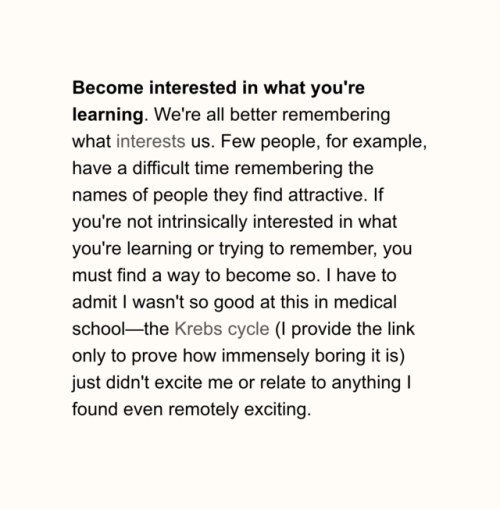

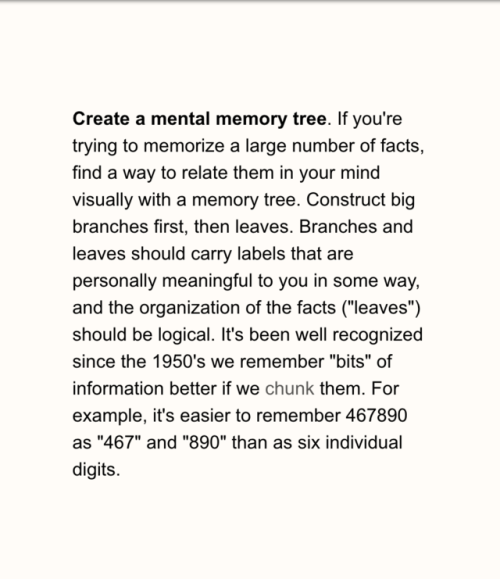
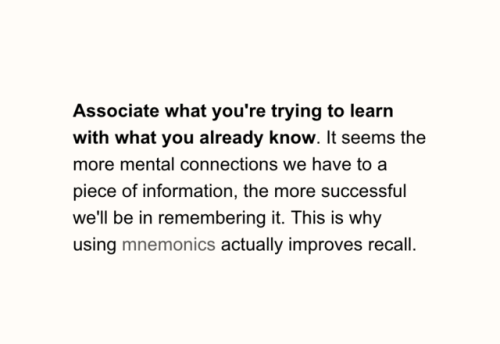

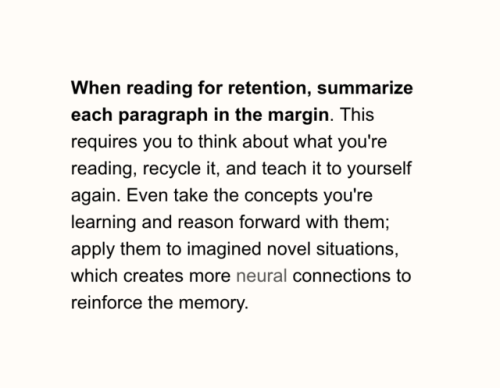
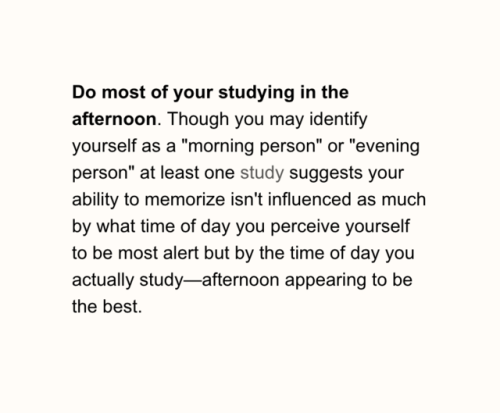

Eight Ways to Remember Anything by Alex Lickerman M.D.
Reference: Research-based strategies to boost your memory and keep it strong via psychology today







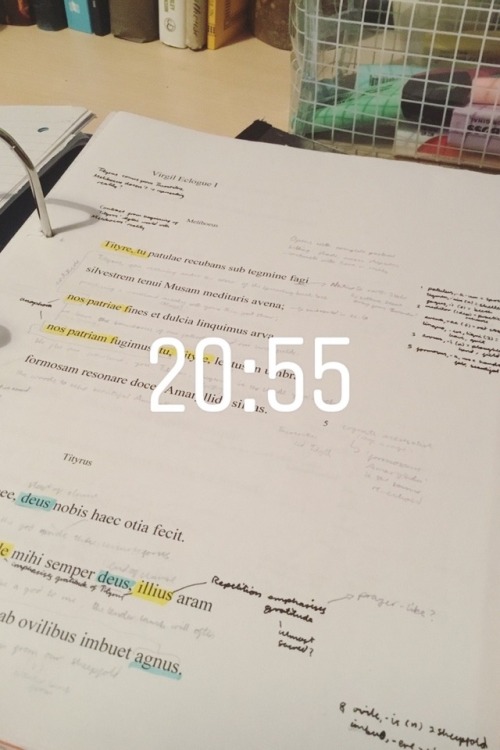

May study challenge day 23!
What type of learner are you (visual, kinetic, etc.)? How does this translate to your study methods?
I’ve never really had one particular learning type that works for me more than others - I try to study in different ways, but I guess my study style fits with a visual learning method more than others?
Today - a photo from a chemistry experiment, reviewing English, chemistry homework, violin practice, piano practice, making chemistry notes, music homework, Latin lit revision, and my cute little productivity tracker with a flower for each day 🌷🌟
-
 chilllll-d liked this · 4 years ago
chilllll-d liked this · 4 years ago -
 sivallia liked this · 4 years ago
sivallia liked this · 4 years ago -
 annitabotas reblogged this · 4 years ago
annitabotas reblogged this · 4 years ago -
 annitabotas liked this · 4 years ago
annitabotas liked this · 4 years ago -
 cutenexttogorgeous reblogged this · 4 years ago
cutenexttogorgeous reblogged this · 4 years ago -
 whistling-banshee liked this · 4 years ago
whistling-banshee liked this · 4 years ago -
 andrejupiter liked this · 4 years ago
andrejupiter liked this · 4 years ago -
 mathletically-inclined liked this · 4 years ago
mathletically-inclined liked this · 4 years ago -
 somuchpaprika-blog liked this · 4 years ago
somuchpaprika-blog liked this · 4 years ago -
 quinz86 liked this · 4 years ago
quinz86 liked this · 4 years ago -
 ephemeralmotif reblogged this · 4 years ago
ephemeralmotif reblogged this · 4 years ago -
 fugitivehugs reblogged this · 4 years ago
fugitivehugs reblogged this · 4 years ago -
 funnysnake2019 reblogged this · 4 years ago
funnysnake2019 reblogged this · 4 years ago -
 lingua-latina reblogged this · 4 years ago
lingua-latina reblogged this · 4 years ago -
 bamio liked this · 4 years ago
bamio liked this · 4 years ago -
 someone-smarter-than-you liked this · 4 years ago
someone-smarter-than-you liked this · 4 years ago -
 emotionallyconstipated liked this · 4 years ago
emotionallyconstipated liked this · 4 years ago -
 funnybunnypunny reblogged this · 4 years ago
funnybunnypunny reblogged this · 4 years ago -
 matholicsanonymous liked this · 4 years ago
matholicsanonymous liked this · 4 years ago -
 draig-diog liked this · 4 years ago
draig-diog liked this · 4 years ago -
 everything-that-is-the-case liked this · 4 years ago
everything-that-is-the-case liked this · 4 years ago -
 mayoramblr liked this · 4 years ago
mayoramblr liked this · 4 years ago -
 cosmic-microwave-background reblogged this · 4 years ago
cosmic-microwave-background reblogged this · 4 years ago -
 xianhu liked this · 4 years ago
xianhu liked this · 4 years ago -
 multifandomstuff-blog reblogged this · 4 years ago
multifandomstuff-blog reblogged this · 4 years ago -
 gizmo-alretha liked this · 4 years ago
gizmo-alretha liked this · 4 years ago -
 princeofwittenberg reblogged this · 4 years ago
princeofwittenberg reblogged this · 4 years ago -
 akmkawser-blog liked this · 4 years ago
akmkawser-blog liked this · 4 years ago -
 andromedaz5150 reblogged this · 4 years ago
andromedaz5150 reblogged this · 4 years ago -
 cahirical liked this · 4 years ago
cahirical liked this · 4 years ago -
 generally-proven liked this · 4 years ago
generally-proven liked this · 4 years ago -
 c-hobbesfan liked this · 4 years ago
c-hobbesfan liked this · 4 years ago -
 crystallooker reblogged this · 4 years ago
crystallooker reblogged this · 4 years ago -
 the-axiom-of-choice liked this · 4 years ago
the-axiom-of-choice liked this · 4 years ago -
 ahvaltik reblogged this · 4 years ago
ahvaltik reblogged this · 4 years ago






